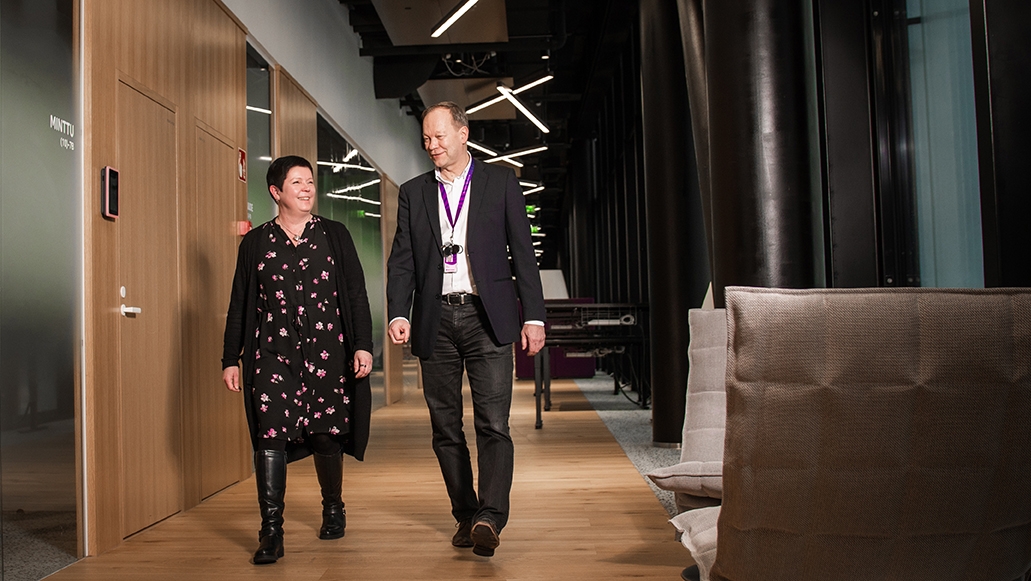

Mehiläinen Työelämäpalvelut tarjoaa kattavat ja modernit työterveyden ja työhyvinvoinnin palvelut johtamisen tueksi, työyhteisöille sekä yksilöille. Palveluvalikoimaamme täydentävät toimialan edistyksellisimmät digitaaliset palvelut. Tarjoamme monipuoliset ja sujuvat palvelut kaiken kokoisille yrityksille toimialasta riippumatta huomioiden erilaiset asiakastarpeet.
Työterveyden yritys- ja henkilöasiakkaiden tarpeet ovat Mehiläisen Työelämäpalveluiden keskiössä ja ohjaavat kaikkea toimintaamme. Rakennamme luottamuksellista yhteistyötä yritysasiakkaidemme kanssa ja panostamme asiakkaan tilanteen ymmärtämiseen ja yhteiseen tiedolla johtamiseen.
Työkykyjohtaminen on keskeinen osa työterveyden palveluita. Työkyky tarkoittaa ihmisen terveyttä ja toimintakykyä, osaamista, arvoja, asenteita ja motivaatiota. Mehiläisellä on monen vuoden kokemus ja tehokkaaksi todennetut digitaaliset palvelut työkykyjohtamisen tueksi.

Ajankohtaista Työelämäpalveluissa
Ajankohtaisia sisältöjä, artikkeleita, uutisia ja palveluita työelämästä.

Työelämäpalvelut - työelämän vaikuttaja
Rakentamassa hyvinvoivaa ja menestyvää työelämää asiakkaidemme kanssa.

Asiakastyytyväisyys ja sen mittaaminen Työelämäpalveluissa
Asiakastyytyväisyyden jatkuva mittaaminen luo suuntaviivat toimintamme kehittämiselle.

Webinaarisarja: Työterveysyhteistyö – välttämätön paha vai mahdollisuus?
Webinaarisarja työterveysyhteistyöstä asiakkaidemme kanssa. Kaikki aiemmat webinaarit ovat katsottavissa tallenteina.

Vastuullisuus työterveysyhteistyössä
Vastuullisempaa työelämää kehittämässä yhdessä asiakkaidemme kanssa.

Monikulttuurisuus työyhteisössä
Monikulttuurisuuden johtaminen työyhteisössä tuo merkittäviä etuja yritykselle.
50 vuotta mittarissa ja elämänsä kunnossa
Viisikymmentä vuotta sitten käärimme hihat suomalaisten yritysten kanssa ja aloimme rakentaa nykyaikaista työterveyttä Suomeen. Vaikka moni asia on vuosikymmenten aikana muuttunut, pitää yksi asia edelleen paikkansa. Pisimpään työelämässä jaksavat ne, joiden työkyky ei ole vain oma, vaan myös työnantajan asia. Huolehditaan työntekijöistä yhdessä tulevaisuudessakin. Työelämä tehtävänä jo 50 vuotta.

Yritysasiakkaamme suosittelevat Mehiläistä
Tutustu asiakkaidemme suosituksiin ja siihen, miksi he ovat valinneet Mehiläisen työterveyskumppaniksi, mihin he ovat tyytyväisiä ja miten Mehiläinen on löytänyt heille sopivimmat ratkaisut. Tutustu kaikkiin asiakasreferensseihimme täältä.
![]()
Caverion
Tiivis ja avoin yhteistyö Mehiläisen kanssa on vahvistanut työhyvinvointia.
![]()
![]()
Satakunnan ammattikorkeakoulu SAMK
EsihenkilöKompassi työkykyjohtamisen ja organisaatiomuutoksen tukena.
![]()
Genelec Oy
Työfysioterapeutin säännöllisillä tehdaskäynneillä saavutettiin selkeä lasku Genelecin pitkissä sairauspoissaoloissa.
![]()
Telia Finland
Telia Finland on ottanut liiketoimintakohtaisen työpaikkaselvityksen osakseen heidän liiketoimintansa kehittämistä.
Ota yhteyttä tai jätä yhteydenottopyyntö
Jos haluat sopia tapaamisen ja keskustella lisää yrityksellesi parhaiten sopivista työelämäpalveluista, ota meihin yhteyttä.
Puhelin (vaihde): 010 414 0112 (pvm/mpm)
Sähköposti: myynti@mehilainen.fi








